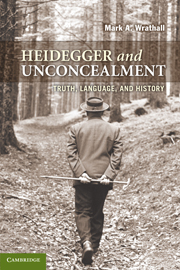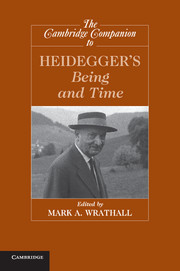Heidegger and Unconcealment
Truth, Language, and History
$32.99 USD
- Author: Mark A. Wrathall, University of California, Riverside
- Date Published: December 2010
- availability: This ISBN is for an eBook version which is distributed on our behalf by a third party.
- format: Adobe eBook Reader
- isbn: 9780511855573
Find out more about Cambridge eBooks
$
32.99 USD
Adobe eBook Reader
Other available formats:
Hardback, Paperback
Looking for an inspection copy?
This title is not currently available on inspection
-
This book includes ten essays that trace the notion of unconcealment as it develops from Heidegger's early writings to his later work, shaping his philosophy of truth, language and history. 'Unconcealment' is the idea that what entities are depends on the conditions that allow them to manifest themselves. This concept, central to Heidegger's work, also applies to worlds in a dual sense: first, a condition of entities manifesting themselves is the existence of a world; and second, worlds themselves are disclosed. The unconcealment or disclosure of a world is the most important historical event, and Heidegger believes there have been a number of quite distinct worlds that have emerged and disappeared in history. Heidegger's thought as a whole can profitably be seen as working out the implications of the original understanding of unconcealment.
Read more- Explains some of Heidegger's most difficult ideas in a clear, straightforward manner
- Offers a book-length exploration of 'unconcealment', a central idea in Heidegger's work that often gets short shrift
- Covers Heidegger's whole career, rather than limiting itself to either the 'early' or 'later' Heidegger
Reviews & endorsements
'No one today writes about Heidegger - especially the later Heidegger - with greater clarity and depth than Mark Wrathall. In this superb collection of essays he has set the philosophical standard for anyone wishing to confront and take seriously Heidegger's accounts of truth, language, and history.' Taylor Carman, Barnard College
See more reviews'Heidegger and Unconcealment covers the whole span of Heidegger's work and is a major contribution to the rapidly expanding literature on Heidegger. It is distinguished both by Wrathall's amazing grasp of Heidegger's still-growing collected works - comprising more than 50 volumes, many of which have not yet been translated - and by his wide-ranging, original, and illuminating discussion of the relation of Heidegger's thought to that of other contemporary thinkers. Wrathall's ability to put Heidegger's abstruse formulations into clear, jargon-free English without losing their subtlety makes this book a perfect way for interested analytic philosophers to enter into Heidegger's world.' Hubert Dreyfus, University of California, Berkeley
'Mark Wrathall's book offers a sustained, penetrating, and deeply illuminating account of Heidegger's work, early and late. It discloses a persistent concern in the deep background of his thinking that helps bring more clearly into focus the distinctness of the various phases of its development, and it does so with a rigor and clarity that will make it much harder to deny Heidegger's relevance to issues that are of central concern to contemporary Anglo-American analytic philosophy.' Stephen Mulhall, Oxford University
'In this unified collection Mark Wrathall gathers Heidegger's works around the central phenomenon of disclosure, and specifically around the disclosure of historical formations of meaning. Written with verve and precision, the book sets a high bar for future scholarship on Heidegger.' Thomas Sheehan, Stanford University
'Wrathall gives a wonderfully clear account of certain key notions of Heidegger's philosophy, including truth and language. His exposition is full of illuminating examples and useful comparisons with analytic philosophers. He offers not only a very valuable addition to Heidegger commentary in English, but also a number of interesting original insights into the questions that Heidegger raises.' Charles Taylor, McGill University
Customer reviews
Not yet reviewed
Be the first to review
Review was not posted due to profanity
×Product details
- Date Published: December 2010
- format: Adobe eBook Reader
- isbn: 9780511855573
- contains: 4 tables
- availability: This ISBN is for an eBook version which is distributed on our behalf by a third party.
Table of Contents
Part I. Truth and Disclosure:
1. Unconcealment
2. The conditions of truth in Heidegger and Davidson
3. On the 'existential positivity of our ability to be deceived'
4. Heidegger on Plato, truth, and unconcealment: the 1931–2 lecture on The Essence of Truth
Part II. Language:
5. Social constraints on conversational content: Heidegger on Rede and Gerede
6. Conversation, language, saying and showing
7. The revealed word and world disclosure: Heidegger and Pascal on the phenomenology of religious faith
Part III. Historical Worlds:
8. Philosophers, thinkers, and Heidegger's place in the history of being
9. Between the earth and the sky: Heidegger on life after the death of God
10. Nietzsche and the metaphysics of truth.
Sorry, this resource is locked
Please register or sign in to request access. If you are having problems accessing these resources please email [email protected]
Register Sign in» Proceed
You are now leaving the Cambridge University Press website. Your eBook purchase and download will be completed by our partner www.ebooks.com. Please see the permission section of the www.ebooks.com catalogue page for details of the print & copy limits on our eBooks.
Continue ×Are you sure you want to delete your account?
This cannot be undone.
Thank you for your feedback which will help us improve our service.
If you requested a response, we will make sure to get back to you shortly.
×


